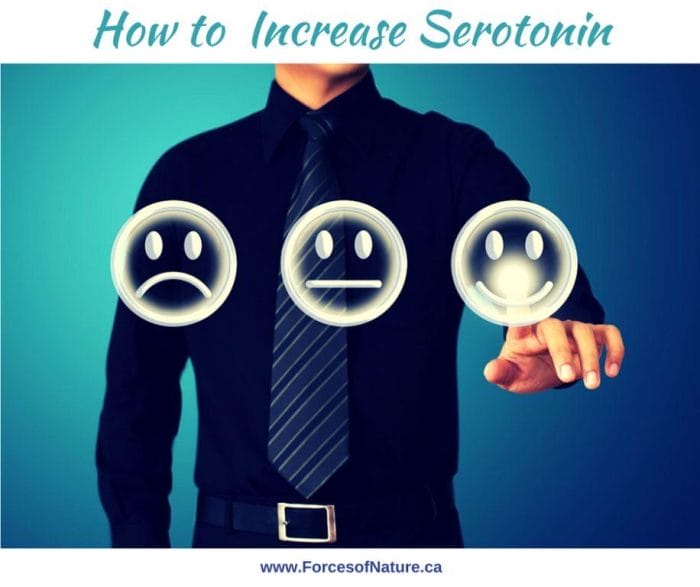
What is Serotonin?
Serotonin is a chemical produced in your brain and gut. It is a neurotransmitter. Neurotransmitters are molecules that help to regulate how your brain works. Surprisingly, 80-90% of your body’s level of this chemical is found in your gut. It is known as the “happy” neurotransmitter, because it elevates your mood, and improves your happiness and sense of well-being. It also helps you feel calmer. Serotonin prevents depression and anxiety. Serotonin is made from an amino acid called tryptophan. Food sources of tryptophan include eggs, cheese, tofu, pineapple, salmon, nuts, seeds, and turkey. Low levels of another neurotransmitter called norepinephrine are also associated with depression. Dopamine is a reward neurotransmitter that leads to feelings of happiness.
What are Signs of Low Serotonin?
Symptoms of low serotonin include:
- Depression or low mood
- Anxiety
- Cravings for sweet or starchy foods
- Sleep disturbances
- Low libido
- Feeling overwhelmed
- Migraines
How Do You Make Serotonin?
Initially, your body uses a nutrient called BH4 and tryptophan to make 5-HTP. This happens through an enzyme called tryptophan hydroxylase and requires the mineral iron. 5-HTP is then converted to serotonin through another enzyme. This enzyme needs active vitamin B6, called pyridoxal-5-phosphate, to do this conversion. Most supplements, including B complex vitamins, contain inactive B6 or pyridoxine hydrochloride. This then needs to be converted by your liver into active B6.
How To Increase Serotonin without Drugs?
This is a great question and also one without a definitive research-based answer. It’s difficult to conduct research that measures the level of serotonin in your brain. We could, perhaps, guess from the things that help us feel good, how to increase this neurotransmitter.
Psychotherapy
Therapy helps people feel better for a reason. It may be because it raises their serotonin level.
Exposure to bright light
We feel better on sunny summer days than dreary winter ones. There are animal experiments showing an increase in serotonin after exposure of the inside of the eye to bright light. I recommend that my patients try to expose their eyes to bright light for at least 20 minutes within an hour of getting up in the morning. (Do not look directly at the sun).
Exercise
There are clear benefits to your mood from exercise. Research suggests that physical activity increases your brain’s serotonin activity.
Diet
Everyone supposes that turkey dinner makes you feel sleepy because it raises your tryptophan level. Therefore, it causes you to make more melatonin, the sleep neurotransmitter. Tryptophan is also one of the building blocks to make serotonin. Research does not support the idea that turkey or other tryptophan-rich foods, raise the brain level of this neurotransmitter. Although, supplemental tryptophan or 5-HTP can increase levels in the brain.
Vitamin B6
Vitamin B6 is a building block to make serotonin. Pyridoxal-5-phosphate is the active form of vitamin B6. Studies on the babies of vitamin B6 deficient mice show decreased activity of the enzyme that is used to make serotonin (tryptophan hydroxylase). Food sources for vitamin B6 include fish, beef liver, beef, poultry and other organ meats, potatoes and other starchy vegetables, and fruit (other than citrus).
Magnesium
Magnesium is also involved in the production of serotonin. Research shows lower magnesium levels in the platelets of suicidal patients with depression than in non-suicidal depressed patients. Magnesium is present in foods like legumes, nuts, seeds, fish, and leafy green vegetables. Because there is a very high demand for magnesium in your body and our food supply is depleted in it, I recommend magnesium supplementation for almost everyone.
Iron
Iron is a co-factor for the enzyme that converts tryptophan to 5-HTP. Iron-rich foods include beef, poultry, and leafy greens like spinach and kale.
Hormone Balance
Deficiency of testosterone, DHEAs, DHT, and progesterone can all contribute to feelings of depression. Deficiency of estrogen, a sudden decline in estrogen, or an excess of estradiol (estrogen) are also associated with depression. Research on reproductive hormones and mental health suggests that reproductive hormones influence the neurotransmitter receptors in your brain. Estradiol increases the rate of the enzyme that produces serotonin. It also decreases the rate of the enzyme that breaks it down.
A Healthy Gut
Since 80-90% of your body’s serotonin is located in your gut, having a healthy gut may be crucial to raising its levels. Good bacteria in your gut help to keep the gut healthy and may influence its production. One study on probiotics found that after probiotic supplementation, there is a significant increase in the concentration of serum serotonin and a decreased level of tryptophan in plasma. Probiotics are found in fermented foods like miso, Kim Chi, yogourt, raw sauerkraut, and kefir.
Active Folic Acid or L-5MTHF
5-MTHF deficiency decreases SAMe in the rat brain. SAMe acts as a natural antidepressant in humans. There is a genetic mutation called an MTHFR mutation in which people have difficulty producing L-5MTHF from food or supplemental folic acid. These people benefit from avoiding supplements with inactive folic acid (referred to as folate or folic acid) and only using supplemental folic acid in the form of 5MTHF or L-5MTHF.
As a licensed naturopath, I often find patients’ mood improves as their hormones achieve a better balance. If you are struggling with depression and feelings of unhappiness, book an appointment here or call the office for more information at 416-481-0222.
Authored by Dr. Pamela Frank, BSc(Hons), ND
Need help with anxiety? You may find this ebook helpful:
Increasing Serotonin Research
Simon N. Young How to increase serotonin in the human brain without drugs. J Psychiatry Neurosci. 2007 Nov; 32(6): 394–399
Leahy LG. Vitamin B Supplementation: What’s the Right Choice for Your Patients? J Psychosoc Nurs Ment Health Serv. 2017 Jul 1;55(7):7-11. doi: 10.3928/02793695-20170619-02.
Almeida MR, Mabasa L, Crane C, Park CS, Venâncio VP, Bianchi ML, Antunes LM. Maternal vitamin B6 deficient or supplemented diets on the expression of genes related to GABAergic, serotonergic, or glutamatergic pathways in the hippocampus of rat dams and their offspring. Mol Nutr Food Res. 2016 Jul;60(7):1615-24. doi: 10.1002/mnfr.201500950. Epub 2016 Mar 29.
Ruljancic N, Mihanovic M, Cepelak I, Bakliza A, Curkovic KD. Platelet serotonin and magnesium concentrations in suicidal and non-suicidal depressed patients. Magnes Res. 2013 Jan-Feb;26(1):9-17. doi: 10.1684/mrh.2013.0332.
Joel C. Bornstein. Serotonin in the Gut: What Does It Do? Front Neurosci. 2012; 6: 16.
Modulation of Tryptophan/Serotonin Pathway by Probiotic Supplementation in Human Immunodeficiency Virus-Positive Patients: Preliminary Results of a New Study Approach. Int J Tryptophan Res. 2017 May 30;10:1178646917710668. doi: 10.1177/1178646917710668. eCollection 2017.
Simon N. Young Folate and depression—a neglected problem. J Psychiatry Neurosci. 2007 Mar; 32(2): 80–82.
Rybaczyk, L.A., et al. (2005). An overlooked connection: serotonergic mediation of estrogen-related physiology and pathology. BMC Women’s Health, 5:12.
Luine,V.N., et al. (1983). Gonadal hormone regulation of MAO and other enzymes in hypothalamic areas. Neuroendocrinology.36(3):235-241.
Dr. Pamela has practiced as a naturopathic doctor in Toronto since 1999. She has received numerous “Best Naturopath in Toronto” awards. She is registered with the College of Naturopaths of Ontario.
Dr. Pamela Frank uses a natural treatment approach that may include acupuncture, herbal medicine, nutrition, diet, vitamins, supplements, and other natural remedies to restore balance and provide long-term resolution to almost any health problem.
